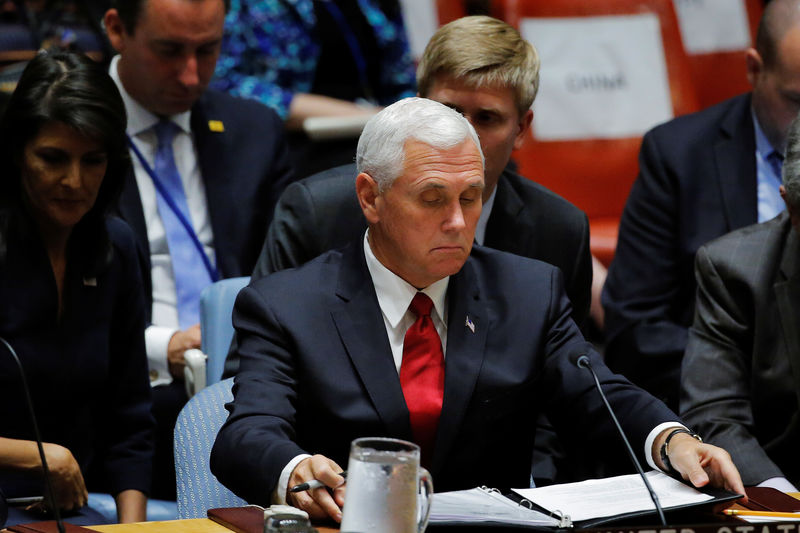By Susan Heavey and Yasmeen Abutaleb
WASHINGTON (Reuters) - Republican leaders sought to nail down the final votes needed to pass what U.S. Vice President Mike Pence on Thursday called their "last best chance" to repeal Obamacare while a new analysis underscored how Democratic-leaning states stand to lose large amounts of federal funding under the legislation.
Senate Majority Leader Mitch McConnell plans to bring the bill introduced by fellow Republican Senators Lindsey Graham and Bill Cassidy to a vote next week, as his party seeks to make good on seven years of promises to erase Democratic former President Barack Obama's signature legislative achievement.
With no Democratic support for the bill, Republicans remain a handful of votes short in the Senate, needing 50 votes in a 100-seat chamber they control 52-48, with Pence casting a potential tie-breaking vote. Senator Rand Paul opposes it and at least six others are undecided: John McCain, Susan Collins, Lisa Murkowski, Dan Sullivan, Rob Portman and Jerry Moran.
Asked whether the legislation will pass, Pence said, "We'll see. We're close."
Republicans, still reeling from their failure in July to win Senate passage of previous legislation to repeal and replace Obamacare, have set a Sept. 30 deadline for passage of this bill.
"This may well be our last best chance to stop and turn around and head America back in the direction of the kind of healthcare reform that's based on individual-choice, state-based innovations," Pence told Fox New Channel.
President Donald Trump has been pushing Congress to repeal and replace Obamacare, which would fulfill one of his top campaign promises from last year.
The current bill would take money that the federal government now spends on healthcare through the Medicaid insurance program for the poor and subsidies to help Americans buy private insurance and distribute it to the states in block grants.
The non-partisan Congressional Budget Office has not yet assessed the bill's effects but independent analyses indicate it would fundamentally redistribute federal healthcare money, generally with Republican-leaning states benefiting and Democratic-leaning states losing.
The nonprofit Kaiser Family Foundation, a healthcare research group, estimated on Thursday that states that expanded Medicaid under Obamacare would lose $180 billion under the bill from 2020 to 2026, while non-expansion states would gain $73 billion in the same time period.
The Graham-Cassidy bill in 2020 would end the Obamacare Medicaid expansion, which many Democratic-governed states had carried out while many Republican-governed states did not, and limit overall federal spending on the five-decade-old program regardless of how many Americans qualify for its benefits.
Republicans have called Obamacare, formally known as the Affordable Care Act, a federal overreach, and say block grants would give states discretion on how to provide healthcare coverage.
WINNERS AND LOSERS
According to the Kaiser Family Foundation analysis, five states would stand to lose more than 30 percent of their federal healthcare money from 2020-2026: New York (down 35 percent), Oregon (down 32 percent), Connecticut (down 31 percent), Vermont (down 31 percent) and Minnesota (down 30 percent). All are Democratic leaning.
The analysis found that six Republican-leaning states would get at least 40 percent more in federal funds: Mississippi (up 148 percent), Texas (up 75 percent), Kansas (up 61 percent), Georgia (up 46 percent), South Dakota (up 45 percent) and Tennessee (up 44 percent).
In total dollars, the state with the largest forecast loss of funds is California, losing $56 billion. The biggest gainer would be Texas, with a $34 billion increase. California, the most populous U.S. state, is Democratic leaning. Texas is the second most populous state and the largest Republican-leaning one.
"It's absolutely true to say the Graham-Cassidy bill over time levels out on a per-person basis the way we distribute money on healthcare, which I think resonates with most Americans," Pence said.
McCain, Collins and Murkowski were the three Republicans who voted against the last Republican healthcare legislation brought up in the Senate, which failed 51-49 in July. Paul, who voted in favor of that bill after previously expressing misgivings, on Thursday went to Twitter to underscore his criticism that the Graham-Cassidy bill does not go far enough to erase Obamacare.
The insurance industry, hospitals, medical advocacy groups such as the American Medical Association, American Heart Association and American Cancer Society, the AARP advocacy group for the elderly and consumer activists have come out against the bill, urging a bipartisan fix to the current law that was abandoned this week.
More medical and civil rights advocacy groups lined up against the Graham-Cassidy bill on Thursday, including the American Psychological Association, the American Congress of Obstetricians and Gynecologists and the NAACP.
The Center on Budget and Policy Priorities, a liberal think tank, estimated that the bill would cause more than 30 million people to lose insurance.

The Graham-Cassidy proposal would let states opt out of the requirement that insurers charge sick and healthy people the same rates, causing a furor among advocacy groups that say it could make health insurance unaffordable for those with pre-existing conditions.